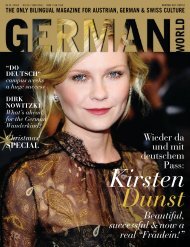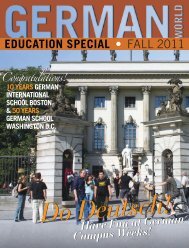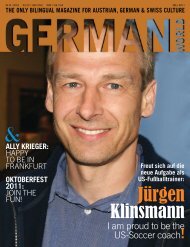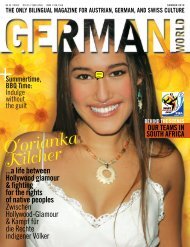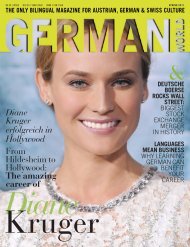Arnold Schwarzenegger - GERMAN WORLD MAGAZINE
Arnold Schwarzenegger - GERMAN WORLD MAGAZINE
Arnold Schwarzenegger - GERMAN WORLD MAGAZINE
Create successful ePaper yourself
Turn your PDF publications into a flip-book with our unique Google optimized e-Paper software.
e<br />
34<br />
EDUCATION<br />
By JODY GARCIA<br />
Linguistic Differences still exist<br />
Thoughts on the German language before and after the wall fell<br />
I<br />
t has been said that, although they both speak German, East and<br />
West Germans don't truly understand each other. The erection of<br />
the Berlin Wall in 1961 created an impermeable barrier which<br />
separated East and West into two speech communities. Even the Wall<br />
itself was given different nicknames. The West German Schademauer<br />
(Wall of Shame) was called in East Germany the Schutzmauer<br />
(Wall of Protection — to keep East Germans safe from Western<br />
decadence). After 40 years of separation, East and West Germany<br />
differed linguistically in distinct ways.<br />
Three different lexical phenomena governed the division between<br />
East and West Germany. First, different words in the East and West<br />
carried the same meaning, giving rise to das Territorium (East) and<br />
das Gebiet (West) for territory; der Ministerrat (East) and die<br />
Bundesregierung (West) for government; die Landstrasse (East) and<br />
die Bundesstrasse (West) for highway; and die Kaufhalle (East) and<br />
das Lebensmittelgeschäft (West) for grocery store. Second, one word<br />
used by both communities came to mean different things. Brigade in<br />
the West meant an army unit but in the East it meant a group of<br />
people working toward a common goal. Third, special vocabulary for<br />
items that did not exist in the other regime were created. This last<br />
category includes proper nouns like Trabi (East) and Coca Cola<br />
(West). Additionally, West German speakers were influenced by<br />
contact with English whereas East Germans were not.<br />
Language is constantly changing and the partition caused East<br />
and West German to change in different ways. The East created new<br />
words to describe their new way of life: Exquisitladen was a term for<br />
stores that sold luxury foreign goods; Konsum was a communist cooperative<br />
store. They also created words to describe conditions<br />
Interested<br />
in EFL Writing for the<br />
German School Market?<br />
www.german-world.com Winter 2010/11<br />
under socialism such as nichterfasster Wohnraum, housing for rent<br />
not through the housing authority and various forms of class<br />
collectives. Gastarbeiter (guest worker) was the linguistic result of<br />
thousands of immigrants pouring into West Germany following the<br />
end of WWII to help rebuild the country. The East did not have this<br />
influx so this term appeared only in the West.<br />
East Germany put forth a policy of Beurteilung, professing socialist<br />
ideology through speech. Party members were encouraged to refer to<br />
women by masculine nouns to show equality between the sexes and<br />
developed a series of Party euphemisms for use in discourse.<br />
West Germans in the professional arena had been taught to value<br />
experience and qualifications whereas East Germans were more likely<br />
to express how they feel. This seemingly brash self-promotion meant<br />
that East Germans, even with equivalent qualifications, were at a disadvantage<br />
in the job market as they were perceived to be less capable.<br />
Post-reunification conversational differences were also noted.<br />
There were significantly different ways of dealing with problems: A<br />
Wessi was much more likely to respond to a problem with “I have the<br />
solution to your problem,” whereas an Ossi was more likely to<br />
respond with “Let's talk about it.”<br />
The 1991 edition of Duden had the challenge of not only updating<br />
the German language but also teaching half the country how German<br />
in the West was different. This reunited Duden included material<br />
from both East and West Germany. During the 40 years of the division<br />
of East and West Germany the Duden was published on both sides of<br />
the Wall, and the editions were quite different.<br />
The author, Jody Garcia, is a graduate student at Tulane University in<br />
New Orleans, Louisiana.<br />
We, a leading German educational publisher, are expanding our team of professional authors. We are looking<br />
for (experienced) EFL authors to write a wide range of materials for pupils learning English in Germany.<br />
You’ll need to be creative, reliable and enjoy working in a team.<br />
Teaching experience and a native command of English are essential, and a knowledge of the German school<br />
system would be an advantage.<br />
Please write enclosing a full curriculum vitae, a list of publications and samples of any written work to:<br />
Ernst Klett Verlag: Frau Kerstin Stuecklen<br />
Rotebuehlstrasse 77 . 70178 Stuttgart, Germany<br />
k.stuecklen@klett.de . www.klett.de





